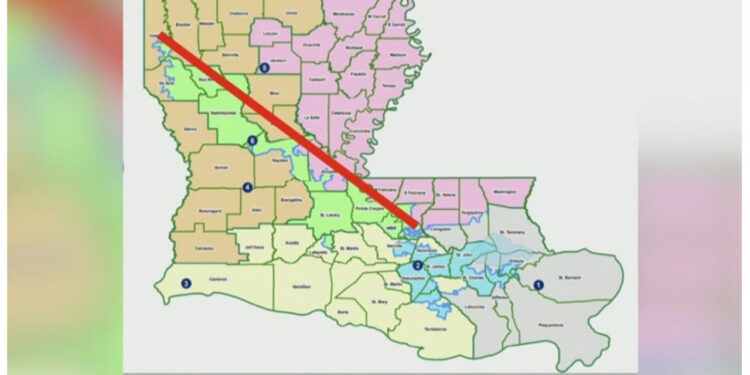The Supreme Court has issued a ruling that Louisiana must conduct congressional elections in 2024 using a House map that includes a second predominantly Black district. This decision comes despite a previous ruling by a lower court that deemed the map to be an unlawful racial gerrymander.
The order permits the utilization of a map where two of the state’s six congressional districts have majority Black populations. This move has the potential to enhance the Democrats’ prospects of gaining control of the closely contested House of Representatives in the 2024 elections.
The state’s top Republican elected officials and Black voters filed emergency appeals, seeking the intervention of the high court to prevent any confusion as the elections approach. It is worth noting that about a third of Louisiana’s population is Black.
The Supreme Court’s order does not address the lower court’s ruling that determined the map relied excessively on race. Rather, it solely prohibits the creation of another new map for the upcoming elections this year.
The Supreme Court may choose to hear arguments in the future regarding the ruling that invalidated the Louisiana map.
In a dissenting opinion, Justice Ketanji Brown Jackson expressed her disagreement with the order issued on Wednesday. She believed that the judges responsible for invalidating the latest map should have been given the opportunity to create a new map before the intervention of the Supreme Court.
According to Jackson, there is minimal concern about voter confusion resulting from the implementation of a new map at this stage, well in advance of the November election.
In the past, liberal justices have expressed their disagreement with previous Supreme Court orders that suspended decisions close to elections. These orders emphasized the importance of providing sufficient time for voters and election officials to ensure a smooth voting process. Justice Brett Kavanaugh, in a similar case from Alabama, highlighted the need for clear and established rules when an election is imminent. However, the court has yet to establish a definitive deadline for determining how close is considered too close.
Louisiana Attorney General Liz Murrill expressed her satisfaction with the order, stating that the Secretary of State had consistently emphasized the need for a map by May 15. Murrill further noted that the plaintiffs did not contest this during the trial. She affirmed her commitment to defending the law and expressed gratitude for the Supreme Court’s decision to grant the stay, ensuring a stable election season.
The court’s decision was praised by a lawyer representing the Black voters. Jared Evans, an attorney with the NAACP Legal Defense and Education Fund, expressed relief that the Supreme Court agreed with their position. In a text message, he stated, “We are very relieved that SCOTUS agreed with us that it’s too close to the election to insert uncertainty. … We will have a map with 2 majority black districts this fall.”
Attorneys Edward Greim and Paul Hurd, representing the plaintiffs who contested the new map, expressed their concerns about the order issued on Wednesday. They argue that this decision allows the state to implement a “brutal racial gerrymander” in the districts where voters will participate in the 2024 elections. According to the attorneys, this would result in districts that are segregated based on race. However, they remain optimistic about ultimately prevailing in the case.
In the past two years, federal courts have blocked two congressional maps in Louisiana due to a series of lawsuits, with the Supreme Court even intervening at one point.
In 2022, the Republican-dominated legislature of the state created a new congressional map in response to population changes observed in the 2020 Census. However, these changes essentially preserved the existing makeup of five districts with a majority of white Republican voters and one district with a majority of Black Democratic voters.
Civil rights advocates took the map to a federal court in Baton Rouge, highlighting the significant Black population in the state. They succeeded in obtaining a ruling from U.S. District Judge Shelly Dick, who concluded that the districts were likely discriminatory towards Black voters.
The Supreme Court has suspended Dick’s ruling pending the consideration of a similar case from Alabama. In a decision that affects both states, the justices have permitted the use of the maps in the upcoming 2022 elections, despite previous rulings by federal judges indicating a likelihood of discrimination.
Lawmakers in Louisiana have been given a deadline of early 2024 by the 5th U.S. Circuit Court of Appeals to draw a new map. Failure to meet this deadline may result in a court-imposed map.
A group of individuals who identify as non-African Americans filed a lawsuit in western Louisiana, alleging that the new map was unlawfully influenced by race, which goes against the Constitution. In April, a panel of federal judges, with a split decision of 2-1, ruled in their favor and prevented the implementation of the new map.
Landry and Murrill, both Republican allies, contend that the new map should be implemented, asserting that it was adopted with political considerations rather than race as the main driving factor. They emphasize that the new map ensures politically secure districts for House Speaker Mike Johnson and Majority Leader Steve Scalise, who are both Republicans. Additionally, some lawmakers have pointed out that Representative Garret Graves, the only Republican whose district is significantly altered in the new map, supported a GOP opponent of Landry during the governor’s race last fall. This alteration to Graves’ district strengthens the argument that politics, rather than race, played a pivotal role in the decision-making process, according to lawmakers.
Voting patterns indicate that the creation of a predominantly Black district would provide Democrats with an opportunity to secure an additional House seat and send a second Black representative to Congress from Louisiana. Democratic state Senator Cleo Fields, a former congressman who is Black, has expressed his intention to run for Congress in the new district, should it be established for the upcoming election.










